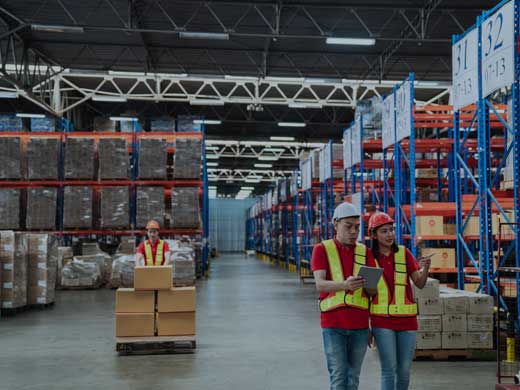Published: 05/06/2023
Italfoods had growing pains.
In 2021 and 2022, revenue for the Ontario-based distributor of 2,000 domestic and imported food products increased by over 30% each year. Italfoods worked with big retailers like Costco and Metro and served hundreds of smaller hospitality and grocery outlets in the Greater Ottawa area. Yet, the company still tracked inventory with pen, paper, and outdated accounting software that no longer met the needs of the business. This growth, combined with obsolete tools, made day-to-day work at the company frustrating, arduous, and significantly less productive. Customer satisfaction declined.
So in 2021, Italfoods hired Ewelina Jaroszek as Director of Commercial Operations to help the business take the next step in its evolution.
"Very quickly, I realized how easy the user interface was. Sharing just with the key people on the team - demos and how the application feels and looks - we thought, oh my God, it’s so easy, so intuitive. We loved using it! We wanted it right now”.— Ewelina Jaroszek, Director of Commercial Operations, Italfoods Inc.
Challenges faced
Labor-intensive inventory management
The high demand for goods made the tracking of inventory with pen, paper, and Excel a very time consuming, errorplagued task. Moreover, the company was constantly short of goods. When Italfoods received its HAACP certification in 2022, maintaining traceability reports with pen and paper burdened the company further.
Arduous accounting
In addition to Italfoods, the company’s controller had to manage the finances of five independent sister businesses. Thus, the controller had to work with six instances of QuickBooks, Sage, and the payroll software. “Just performing simple activities was time-consuming and exhausting,” said Jaroszek.
Inadequate financial reporting
Due to the extensive use of paper, errors and lost information plagued the data. The company could not easily follow its KPIs, which were not readily available in Sage software. Analytics also were almost impossible to get. Even when the data was exported to a spreadsheet, few on the management team knew how to use Excel pivot tables to analyze trends.
High labor turnover
With relatively few business processes in place, employees had a challenging time finding their groove at the company, which led to staff turnover.
Vulnerable servers and corrupted data
With all six of its businesses dependent on three servers in the head office, the company felt vulnerable to a potential data loss from a number of scenarios. In May 2021, Italfoods suffered a data corruption problem that aggravated them for months. In October 2022, one of the servers died. Jaroszek knew what she had to do. In previous jobs, she had been involved in ERP software implementations. Because the leadership team was unfamiliar with this type of software, she made presentations explaining the tool. She soon had the team’s buy-in for an ERP implementation at Italfoods.
Solution
Jaroszek recruited an internal ERP team to execute the project. They agreed on the following selection criteria:
-
A cloud-based system to reduce their vulnerability to server breakdown and data loss as well as support remote access to the ERP
-
A robust Warehouse Management System that would improve efficiencies in distribution
-
A centralized database for each of their six companies while still operating them as independent accounting entities within one system
-
Flexible, real-time financial tools for easy in-depth business analysis
-
Easy to use because few employees had ever used an ERP, much less had any coding experience.
Her five-person team attended demos, shared notes, and pared down the vendors to a short list of four: Acumatica, Business Central, Oracle NetSuite, and Fidelio. Then the first two vendors were eliminated.
Oracle NetSuite vs. Fidelio
Although Oracle NetSuite was well-established globally and had a lot of money behind it, Jaroszek’s team found the following short-comings:
-
The user experience was “too advanced” for the Italfoods staff given that they had no prior experience with ERP systems.
-
The sister companies could not co-exist as independent entities that shared common databases within the ERP. Instead, the system required parent-child relationships, which was not what Italfoods was looking for.
-
Significantly higher expense. Each additional ERP module had to be purchased. During implementation, deviations from the established timeline would lead to fines from Oracle NetSuite. Furthermore, Italfoods did not want to pay for fancy functions it did not need. In contrast, Fidelio offered a much more favorable user experience.
Two other factors also weighed strongly in Fidelo’s favor:
-
70% cost savings on license fees - Jaroszek calculated a cost of ownership over five years for Fidelio and Oracle NetSuite. Fidelio would save Italfoods 70% on the cost of licenses. Furthermore, due to Jaroszek’s experience in effective ERP implementation, she earned a 15% discount on Fidelio fees.
-
Local customer support - Jaroszek visited the Fidelio offices and liked the interactions and excellent follow-up of the team. As the representative of a local company, she wanted to work with another local company as opposed to a global behemoth.
Implementation
During implementation, Jaroszek’s team tested every single process, practiced on the system, and asked questions.
“I went outside of the standard implementation schedule,” she said, “but they [Fidelio] supported me all the way, and even though I wanted to jump from one subject to another, I got my answers. So I was very pleased with that.”
Results
Today, the implementation of Fidelio benefits Italfoods in the following areas:
Inventory management
-
Real-time status—Any authorized person now has real-time visibility into the inventory status of any item, no matter how many locations it’s stored in. As a result, customer satisfaction is climbing.
-
Reserved stock—Once an order is placed, that stock is no longer available for the next customer.
-
Decrease in SKUs—The improved visibility into inventory has helped the company reduce the number of SKUs.
Accounting management
Previously, the financial controller had to deal with six instances each of three accounting-related applications to manage the six sister companies independently.
Now, these six companies share the following:
-
Databases for information they have in common, such as customers, suppliers, and products
-
An easy-to-use interface with identical functions, categories, and attributes.
Financial reporting
Before the ERP system, getting year-over-year sales reports required the leadership team to compare the 20-page report of one year with the 20-page report of another. With Fidelio, leaders can access these numbers anytime, in real-time, in numeric or graphical representations. Furthermore, through dynamic analysis views, the system enables leaders to drill down into, let’s say, a big-picture number like “equipment repair costs” to find out what expenses make up that total.
Labour retention
Fidelio’s automation and streamlining of processes have reduced the number of employees at Italfoods. The company no longer has to hire new staff during peak seasons.
But when people are hired, they’re easily trained on well-defined processes. They carry out less repetitive tasks. Also, multiple employees are cross-trained on tasks so absences from work no longer bottleneck the workflow. Salespeople on the road now work more productively because they have remote access to company systems.
Data security
Because Fidelio Cloud ERP operates out of Microsoft Azure’s infrastructure, Italfoods no longer worries about managing its on-site servers or data loss.
What’s next for the company?
Italfoods’ digital transformation enables the leadership to plan the implementation of other digital tools to boost productivity:
-
EDI with key customers to automate order processing
-
A Warehouse Management System (WMS) in 2024 to cut costs
-
E-commerce within two years to expand market reach and provide customers with 24/7 access to their orders
-
Bill of materials for private label orders to enable better cost control
-
Input recipes in Fidelio to keep track of changes and costs
At the heart of all these business-building projects is reliable, real-time digital information that improves decisionmaking. “Obviously with Fidelio, not only do I love your dynamic filters, but I can have any information that I want, and to be honest with you, the sky’s the limit.”

Are you a manufacturer or a distributor? To find out more about the various functionalities and flexibility of the ERP. Fidelio system, contact us.





